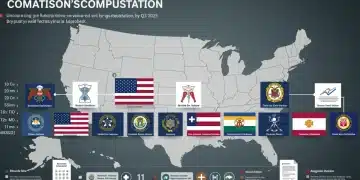Unemployment benefits for gig economy workers explained

Unemployment benefits for gig economy workers provide crucial financial support during periods of job loss, but eligibility and access can vary widely based on state regulations and individual circumstances.
Unemployment benefits for gig economy workers are an essential safety net in today’s job market. Have you ever wondered how these benefits apply to freelancers and contractors? Let’s dive in to clarify what you need to know.
Understanding unemployment benefits
Understanding unemployment benefits can seem complicated, especially for those in the gig economy. It’s essential to grasp how these funds work to ensure you’re getting the support you need during tough times.
What are unemployment benefits?
Unemployment benefits are payments made by the government to individuals who have lost their jobs and are actively seeking new employment. They provide much-needed financial support to help cover living expenses while you look for work.
How do benefits work for gig workers?
For gig economy workers, the situation is a bit different. Traditional unemployment benefits might not apply, as these workers often have non-traditional employment statuses. Yet, many states have adapted their programs to include gig workers.
- Eligibility varies by location, so it’s crucial to check your state’s regulations.
- Some gig workers may qualify under specific conditions, such as having a recent history of self-employment.
- It’s essential to gather your working history and pay records when applying.
Understanding the precise requirements in your area can make a significant difference. States have differing rules that could either help or hinder your access to these benefits.
If you’re unsure about your eligibility, consider reaching out to local employment offices. They can provide the necessary guidance to help you navigate the system effectively. Being proactive can ease your financial worries during periods of unemployment.
Moreover, it’s beneficial to join groups or forums with fellow gig workers. Sharing experiences can offer insights into what worked for others and enhance your understanding of earning eligibility.
Key Takeaways
Ultimately, taking time to understand the nuances of unemployment benefits can empower gig economy workers. Knowing your rights and the available resources is vital, so you won’t miss out on the assistance you might qualify for.
Eligibility criteria for gig workers

Understanding the eligibility criteria for gig workers is essential for accessing unemployment benefits. These criteria vary significantly from state to state, creating a complex landscape for gig economy participants.
Who qualifies as a gig worker?
Typically, gig workers include freelancers, independent contractors, and those who work for platforms like Uber or TaskRabbit. Every gig worker must recognize that their employment status affects their eligibility for benefits.
Requirements for unemployment benefits
To be eligible for unemployment benefits, gig workers usually need to meet specific requirements, which may include:
- Having a certain amount of earnings within a specified period.
- Proving that they have lost work due to circumstances beyond their control.
- Registering for work and demonstrating efforts to find employment.
These requirements aim to ensure that those who rely heavily on gig work have a fair chance to receive assistance when they need it most. Understanding these nuances can help workers to prepare their applications correctly.
In addition, many states have adapted their criteria to account for gig workers’ unique situations. For instance, the Pandemic Unemployment Assistance (PUA) program expanded eligibility to include those who typically wouldn’t qualify, like those with part-time work or self-employed individuals.
If gig workers feel uncertain about their eligibility, local labor departments can provide helpful resources. Staying informed about changes in regulations is vital, as new laws are frequently rolled out to help workers adapt to the evolving job market.
Important things to remember
- Check your state’s rules and requirements for benefits.
- Document your earnings and work history.
- Be proactive in seeking assistance and information.
Proactively understanding these criteria allows gig economy workers to navigate their options and secure support when necessary. Remember, the help often exists; knowing how to access it is key.
How to apply for benefits
Knowing how to apply for benefits is crucial for gig economy workers. The application process can be straightforward, but it requires proper preparation and understanding of the requirements.
Gather your documents
Start by collecting essential documents. You’ll need to provide proof of your earnings and work history. Important items include:
- Tax returns or 1099 forms that detail your earnings.
- Payment receipts from gig platforms.
- Records of your hours worked, if applicable.
Having these documents ready can streamline your application process and avoid delays.
Check your state’s requirements
Each state has different procedures and requirements. Visit your state’s unemployment office website to understand their specific application process. Some states offer online applications, making it easier than ever to apply from home.
While completing the application, be honest and thorough in your descriptions. Any discrepancies may lead to delays or rejection of your claim. Once submitted, keep track of your application status to ensure timely updates.
In many states, you might also have to register for work and report weekly to maintain your eligibility. This requirement helps demonstrate your commitment to seeking new opportunities.
What to expect after applying
After submitting your application, you’ll usually receive a notice about your eligibility within a week or two. If approved, your benefits will be calculated based on your earnings and the state’s guidelines. Payment frequency will also vary by state, so understanding this can help you plan your finances.
- Respect reporting requirements: Most states require you to report any work and income while collecting unemployment benefits.
- Appeal if necessary: If your claim is denied, understand that you have the right to appeal the decision.
- Stay in touch with your unemployment office if you have questions or concerns during the process.
By understanding these steps, gig workers can navigate the application process confidently, ensuring they receive the support they need during unemployment.
Challenges faced by gig economy workers

Gig economy workers often encounter unique challenges that can impact their financial stability and overall well-being. Understanding these challenges is crucial for both workers and policymakers.
Job security and income variability
One of the biggest challenges for gig workers is the lack of job security. Unlike traditional employees, gig workers may find their income fluctuating significantly from month to month. This variability can make planning for expenses difficult.
- Gig workers may not have a steady paycheck.
- Income can depend on demand for services.
- Unexpected downturns can lead to financial strain.
As a result, creating a budget can be tough. Gig workers often need to save more during profitable periods to cushion against lean times.
Access to benefits
Another major hurdle is the limited access to benefits. Many gig workers are classified as independent contractors, which means they often miss out on essential benefits like:
- Health insurance
- Retirement plans
- Paid leave
This absence of benefits can be daunting, especially when it comes to health care costs or planning for retirement. Without employer contributions, gig workers must take personal responsibility for their financial security.
Additionally, navigating the health care system can be overwhelming. Many gig workers aren’t sure what options are available, which leads to delayed or inadequate health care.
Isolation and lack of support
Isolation is another common issue among gig economy workers. Unlike traditional work environments, gig work often lacks community support. Many workers find themselves alone, making it harder to share experiences or seek advice.
Engaging with online forums and local groups can help alleviate some feelings of isolation. These connections can provide important networking opportunities and a sense of belonging.
By recognizing and addressing these challenges, gig economy workers can better prepare for their unique situations and work towards solutions that enhance their stability and well-being.
FAQ – Frequently Asked Questions about Unemployment Benefits for Gig Economy Workers
What are the eligibility criteria for gig workers to receive unemployment benefits?
Eligibility criteria vary by state but typically include proof of earnings, job loss due to external factors, and an active job search.
How can gig economy workers apply for unemployment benefits?
Gig workers can apply by gathering necessary documents, visiting their state’s unemployment office website, and completing the required application process.
What challenges do gig economy workers face regarding unemployment benefits?
Challenges include job security, variable income, limited access to benefits, and a lack of community support.
How can gig workers support each other during times of unemployment?
Joining online forums or local support groups can provide gig workers with valuable connections, shared experiences, and resources.





